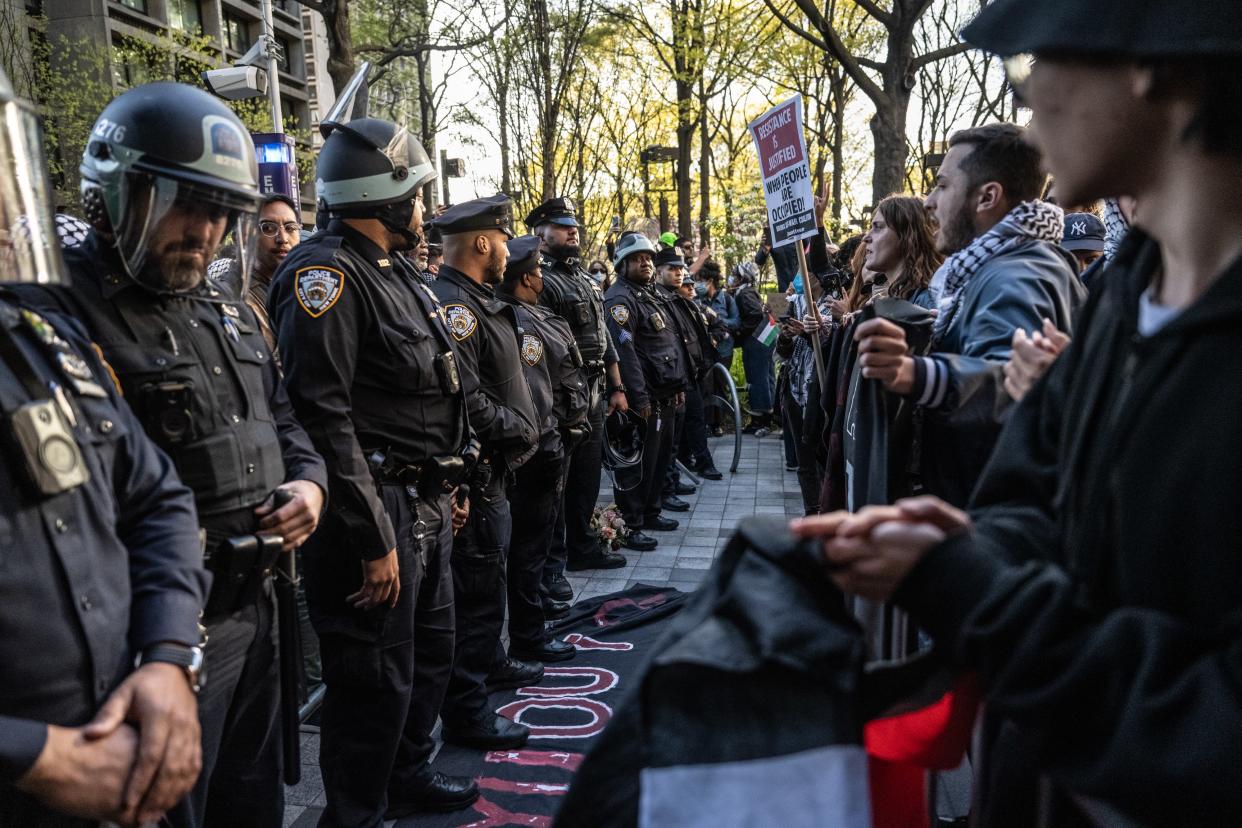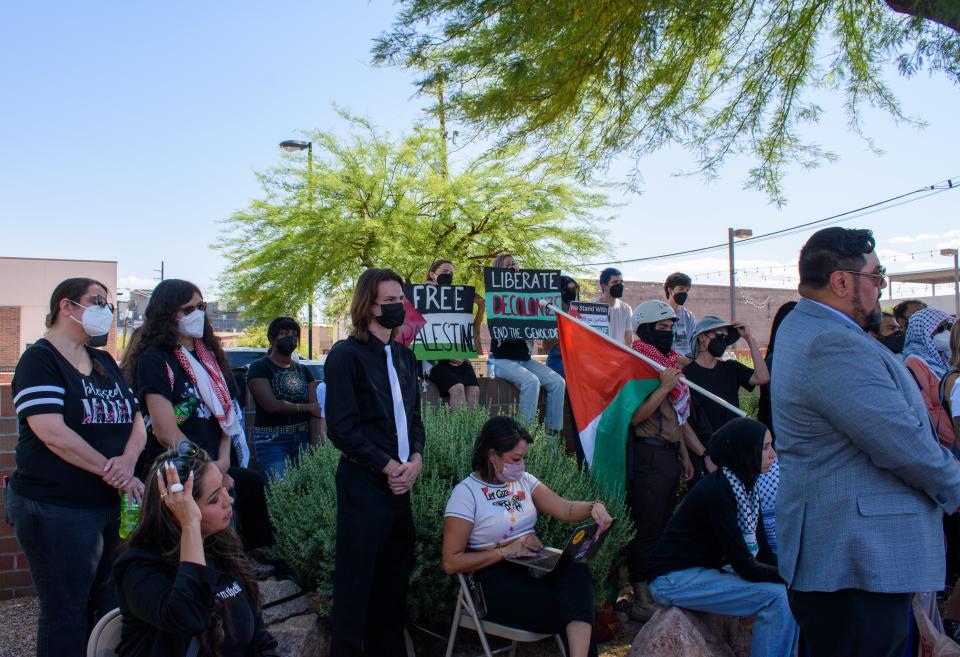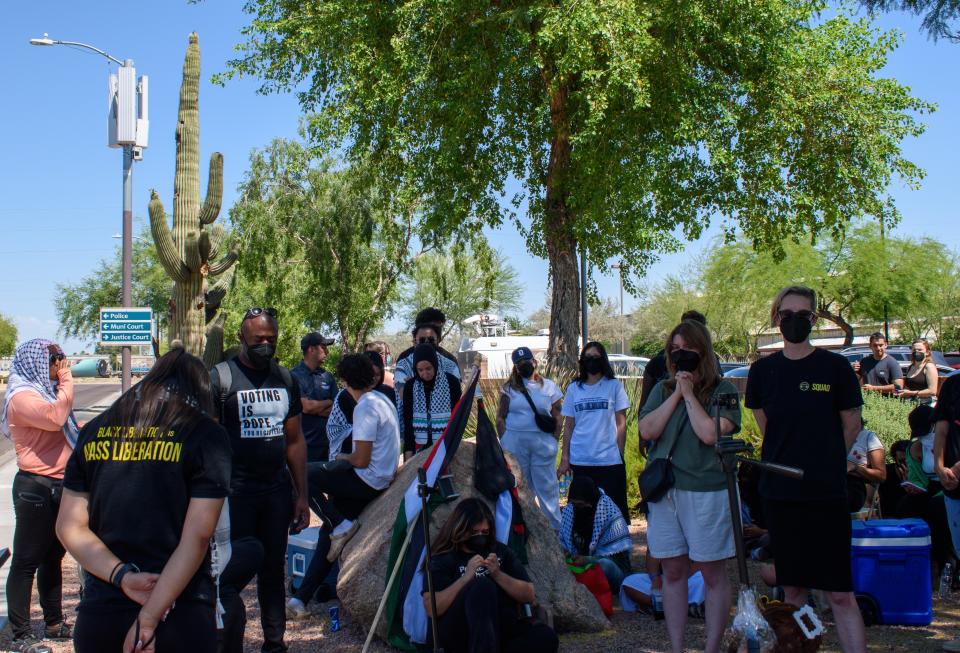Campus Protests for Palestine: Students Face Criminal Charges, Disciplinary Hearings

Stephanie Keith/Getty Images
This story was written by one of Teen Vogue's 2024 Student Correspondents, a team of college students covering the election cycle from key battleground states.
More than 3,000 people were arrested or detained at campus protests for Palestine this spring. Most of the Gaza solidarity encampments have since been disassembled, but students are now dealing with subsequent challenges. Some are trying to sort out whether they can still technically graduate despite being suspended, and many face potential criminal charges.
Legal advocacy organizations and human rights clinics are urging college administrations not to use responses to activism that are discriminatory or punitive. On the ground, meanwhile, experienced activists and students are engaging in another form of public solidarity: community campaigns for legal defense.
During a May 14 hearing in a Phoenix suburb, people crowded the courtroom to stand with folks who had been arrested at Arizona State University's (ASU) Gaza solidarity encampment. One abolitionist group helped source legal representation for those detained, while trained volunteer court watchers occupied seats inside. Organizers also hosted a rally outside and live streamed the public hearing.
Matthew Aguilar, with Mass Liberation Arizona, tells Teen Vogue that the goal of the public pressure campaign is to get the charges against activists dropped. “Packing the court is a way for us to fill that room with support for our neighbors and inundate the system to a point that [prosecutors] don’t want to be here in these numbers and maybe they shouldn’t do it,” he explains.
Because ASU police failed to provide the necessary paperwork, as the Phoenix New Times reported, nearly all of the protesters had their cases temporarily dismissed. That doesn’t mean the legal process is over, though; in Arizona, charges can be refiled up to one year after an incident takes place.
“These tactics do get used in different states at different times," says Xavier T. de Janon, director of mass defense at the National Lawyers Guild. "But there is a playbook to it.”
Likewise, folks arrested on the first day of protests for Palestine at the University of Texas at Austin (UT-Austin) had their charges dropped, but in Texas they can be refiled up to two years later.


What kind of charges are protesters facing?
Prosecutions will move at divergent paces depending on the type of charge and where a person is tried. According to de Janon, many protesters on US campuses were charged with misdemeanor trespassing. Those cases, involving relatively low-level offenses, are likely to be dismissed or get resolved with a plea deal.
Other demonstrators are facing more serious charges, such as resisting arrest by use of force and assault on an officer. “Most political prosecutions are designed to stop protests," de Janon says. "That’s why they’re so intense, so trumped up.” Cases involving felony charges could stay open, extending into the fall.
In New York City, journalists and legal observers noted that students at Columbia University, an elite private institution, were receiving lighter charges than those at City College of New York, a large public school. Hellgate’s Nick Pinto reported, “As people trickled through the court, a pattern emerged: People arrested at Columbia were being charged with trespassing, a misdemeanor, while those arrested at City College were being charged with burglary, a felony.” The latter cases often take longer to process due to court procedures.
“The state isn’t just randomly prosecuting, randomly making decisions,” de Janon says.
Ohio attorney general Dave Yost, a Republican, said protesters may have committed a felony, leaning on a 1950s law that prohibits people from wearing masks (and was originally passed to deter the Ku Klux Klan). University of North Carolina staffers claimed student activists wearing medical masks broke a similar state law, even though the legislation was amended in 2020 to allow a public health exception for mask wearing.
Around 15 states have laws banning masked demonstrations. Students arrested at the University of Florida were charged with wearing masks in public. Governor Greg Abbot of Texas and UT-Austin administrators cited a university mask-wearing ban as one justification to dispatch state troopers to an on-campus protest for Palestine.
Immigration attorneys are especially concerned about how international students will be penalized. Governor Ron DeSantis of Florida recently said international student protesters should have their visas canceled, and some lawmakers in Congress have floated bills to make that a reality.
“Sadly, prosecuting people who are more vulnerable… does hurt the movement because now they need more support,” de Janon says.
The relationships between prosecutors — and the political environment in which they operate — can affect the outcomes for students confronting the criminal legal system. Even if a district attorney declines to press charges, as Larry Krasner did in Philadelphia, the door is still open for other offices to pursue them. For now, though, University of Pennsylvania students arrested while allegedly attempting to occupy a campus building, renamed for Gaza professor Refaat Alareer, have not been charged.
How are students being disciplined by schools?
Says de Janon, “When a student gets arrested, what the universities have been doing is not only putting the student through the criminal process but also through a student disciplinary process. So, essentially, a student has to face two different proceedings, sometimes at the same time.” For example, New York University instructed students to complete reflection papers and ethics modules in order to return to campus after most of their charges were dismissed.
Several other colleges are currently being sued for alleged unlawful mistreatment of protesters, including ASU.
University of North Carolina, Chapel Hill, is diverting the school’s entire $2.3 million diversity, equity, and inclusion budget to campus police; according to The Guardian, some members of the university’s board of trustees, which made the decision, cited the campus protests for Palestine as a reason for the reallocation of funds.
How are organizations supporting protesters?
Mass Liberation Arizona “wants to ensure that it’s not normal for folks to have to do this, but we will do it if we need to go in there en masse,” Aguilar says. “Court watching and court packing is an act of solidarity, which also means that you’re uplifting the demands or you’re saying something about the conditions that put the person in that situation. So when we’re protesting, when we’re engaging in these tactics, community defense and mutual aid is necessary.”
Crowdfunding is another tool people are employing to aid protesters whose carceral release is dependent on cash. Organizers raised funds to cover the $10,000 bonds imposed for people arrested at the California State Polytechnic University, Humboldt, Gaza occupation, and bail set at $5,000 for one University of Florida student.
Days after arrests at Emory University in Georgia, Governor Brian Kemp, a Republican, signed “the state’s latest weapon to criminalize protest: making bail unpayable. Community bail funds, which have served as an important mutual aid strategy for Black communities and racial justice activists, are now functionally illegal,” wrote nia t. evans for Mother Jones.
“It was an important escalation of the movement for Palestinian solidarity,” says Sarah, a Jewish student at ASU who helped coordinate the encampment. Sarah, who asked to use a pseudonym in order to speak candidly about ongoing campus events, staked out the court that day because their friends were detained in the protest. “We just have to continue escalating, showing people that they don’t care about us and that we have to care for each other.”
Stay up-to-date with the politics team. Sign up for the Teen Vogue Take
Originally Appeared on Teen Vogue
More great activism coverage from Teen Vogue:


